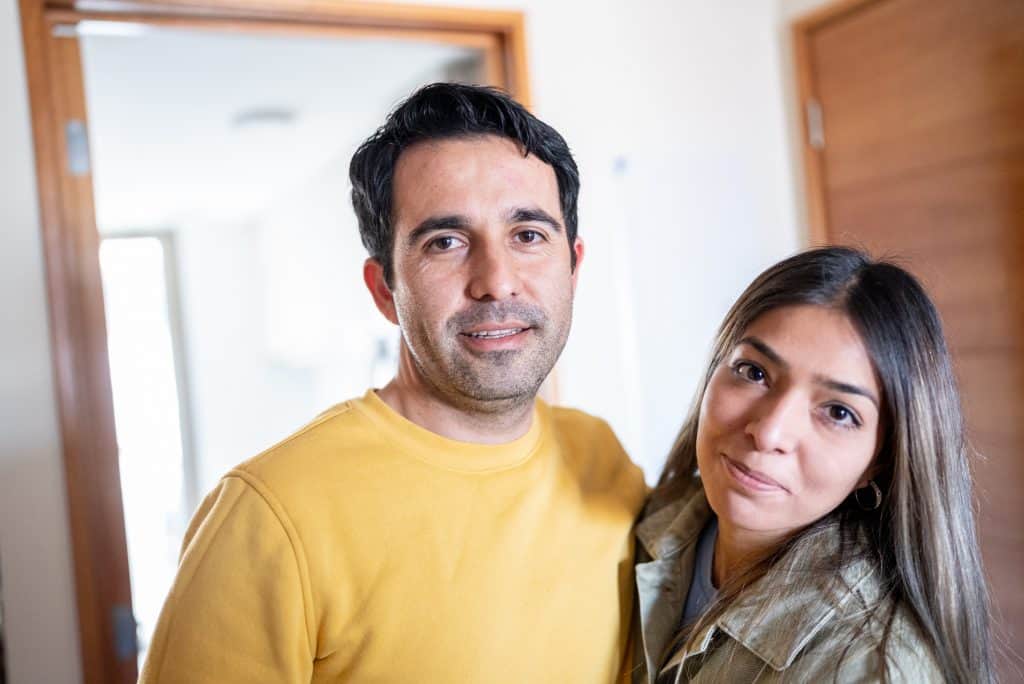Recently, Jake* contacted me via e-mail. He’d listened to almost every interview we had done and agreed with almost everything we had said, except for this: Porn is not about sex, but about fantasy.
After some back and forth discussion, we both agreed that at its core porn is fundamentally about escaping into an alternate reality to avoid things like real-life pressures and rejection. It’s a self-medicating “fix” where you can get a need met without sacrificing your independence or taking a real risk.
Our argument was one of nuance, but he brought up an interesting perspective worth exploring. Because porn is so rampant, because marriages are shriveling and dying, and because I don’t want to give the enemy any ground, we are diving into this: what role does sex have in a relationship that’s been marred by porn?
What role does sex have in a relationship marred by porn?
Relationships involve two people with two different perspectives and experiences, so let’s take a look at the different sides of the conversation Jake* brought up.
Perspective 1: Witholding sex encourages the porn cycle.
Jake’s point is this: When sex becomes a tool used by someone who is betrayed to shame or hold sin over her partner’s head, it can encourage the cycle she ultimately wants to stop.
What’s the cycle?
- Fear of rejection.
- Escape into porn.
- Momentary release and subsequent “high.”
- Shame, which then compounds the fear of rejection, setting the cycle to begin again.
Rejecting your spouse when he desires to be with you sexually because of his previous sin could reinforce in his mind why he might have turned to porn in the first place.
When my husband first encountered porn as a young child, he looked out of curiosity. He kept coming back because it made him temporarily feel good, even though he knew this wasn’t something he should be doing. But the draw to come back to a place where he could escape his real-world problems and not face the possibility of rejection from the people around him was hard to ignore. The more he delved into porn and sought that as a refuge, the less he invested in real life relationships.
As he was in the process of leaving porn, he had to confront how and why he shielded himself from possible rejection. He had to face the emotional wounds that led to his porn addiction. He was already filled with shame and regretted heavily his bringing porn into our marriage.
By engaging in sex, we were able to reclaim the true nature and meaning of sexual intimacy. It took me a long time to be able to fully engage in sex with him. I had to deal with my own feelings and fears. It is perfectly okay to set boundaries with your spouse and to not want to or engage with your spouse sexually while you are processing this betrayal. But it’s important to keep his needs and feelings on your radar too.
One of the most powerful ways a wife can encourage, affirm, and minister to her husband is by responding to him sexually. I’ve already discussed a man’s need for affirmation and respect; probably the most powerful way you can affirm and respect your husband is when you respond to him sexually. –Bob Lepine, Family Life article
Perspective 2: Spouses should be trustworthy with something as intimate as sex.
On one hand, as someone who has been betrayed, I can make this argument: How can I trust my spouse with something so intimate when he has selfishly turned to something else to satisfy his needs?
Even when I know his porn use is not a direct reflection on me (as I finally learned), it still feels like he is cheating me, cheating himself, and cheating us out of the intimacy we could have if he hadn’t turned to porn.
Furthermore, does this mean that anytime I say “no,” he can use this an excuse to justify returning to the cycle? Absolutely not. Porn use is never okay, and regardless of whatever anyone does or doesn’t do, we choose how we respond. What if I’m not withholding because of bitterness but because I really do just have a headache? (It’s true–sometimes we really do just have a headache.)
On the other hand, I know if I use my grief, anger, and insecurity to build an impenetrable wall to try to shut out and shame my repentant and recovering spouse, how could he practice real intimacy? How could he truly know whether or not true intimacy (emotional, physical, and spiritual) could satisfy him and meet a need he had been trying to fill most of his life?
How do we approach sex after betrayal?
We know two things: it is powerful for a man to be accepted and affirmed sexually, and it can be exceedingly difficult for a woman to affirm his sexuality when she feels betrayed. This conundrum is a cycle unto itself. How do we break it so that our marriages can flourish and so that both partners find freedom from addiction and bitterness? Here are some places to start:
1–Affirm your spouse’s feelings.
Husbands: Porn is forgivable, yes. Excusable, no. Porn is never okay. Your spouse needs to hear you own up to the sin. She needs to know what you’re doing to be proactive about fighting the addiction. Validate her when she’s struggling with hurt, anger, insecurity, and frustration. Really listen, even when it’s hard. Especially when it’s hard.
Difficult conversations are often not fun, but when we are truly honest and authentic with each other (no matter how messy that is), intimacy begins to grow when we give our partners space to be real. Understand she needs time to heal, to grieve, to come to terms with what has happened.
Wives: Chances are, your spouse has spent a lifetime looking for validation in something false. He is probably genuinely afraid of what it takes to be fully intimate with another human being. Validate the fear. Come towards him with the understanding that recovering from a porn addiction isn’t easy.
He’s having to change a mindset along with a whole host of behaviors. He’s unlearning and relearning all at the same time. Ask him about his childhood and young adulthood. Help him identify what might have been missing from his life when he was a kid. Find ways to show compassion as he processes his struggle.
2–Check your intentions.
Wives: Before you say “no” to your husband’s advances, stop and take stock. (You always have a choice–sex is designed to be between two consenting adults. It’s okay to take some time and space for healing.)
- What is the true motivation for your “no”?
- Are you trying to prove a point?
- Are you using it as a form of self-protection?
- Is your “no” a proverbial stone you are casting at the adulterer?
I understand–I’ve been there. But I’ve also seen the benefit of allowing intimacy to grow, even when I was afraid I might be giving away too much of myself or when I thought giving myself might be misconstrued as deeming porn use as no big deal.
At the core of what God intended, sex is about creating and growing intimacy. It’s about oneness. When you say “yes” to your husband, you take a step toward the healthy growth of your marriage. You commit to being one with him, just like you did when you said your vows. You may not want to engage, but be sensitive to the Holy Spirit and ask if He is leading you into this for your mutual healing.
Husbands: Before you ask your wife for sex, stop and take stock. You want affirmation and pleasure. How have you affirmed and pleased her? Consider how you’ve shown love to her outside the bedroom.
- Have you talked with her?
- Have you asked her about how she’s doing? Feeling? Dealing?
- Have you been physically affectionate with hugs, kisses, or a back rub (or two)?
- Have you done something that makes her life a little easier? A little sweeter?
Paying attention to all of her makes her feel safer, more understood, and more known. She knows you’re choosing her.
3–Understand that sacrifice is necessary.
Be ready to not get what you want sometimes. No one person on this earth can ever meet all of your needs all of the time. Sometimes you will both have to go without what you feel you want or need. Our issues can prevent us from giving freely, our sin can derail our best intentions, and our selfishness can fortify our walls.
But just as Jesus’ sacrifice was necessary so we could have right relationship with God, our personal sacrifices are necessary for us to have right relationships with each other. Being willing to sacrifice shows love. Love builds intimacy. Intimacy fuels connection. Love makes sacrifices for the betterment of the union. Now that is a cycle worth repeating.
4–Ask God for help.
It is hard to resist porn. It is hard to forgive. It is hard to trust, and it hard to regain trust. It is hard to learn how to be intimate with another human being after you’ve been burned or if you’ve never had the opportunity in the first place. It’s hard to give, and it’s hard to receive. It’s hard to be selfless, have healthy boundaries, and express your feelings in a constructive manner.
Face it, with or without a porn addiction, marriage is hard. But, we don’t have to go at it alone.
The only way Craig and I have been able to have a real, intimate, connected relationship is because we plug into a God who helps us be better than we ever thought possible. Jesus has revealed our sin, forgiven our sin, healed us from our sin, and used our experiences–good and bad–to mold and refine us individually and as a team. He is the One we can turn to when we feel hopeless, when things look bleak, when we don’t know what to do or if we are really perceiving things correctly.
When we try to go at things alone, things can go downhill quickly. But when we turn to Him in prayer and thanksgiving for what we already have, our perspectives shift. We begin to rely on God’s protection instead of our own. We are able to love more freely because He first loved us. We are able to recognize fear and turn our worries to Him. He has creative solutions to our trickiest problems and He longs for us to invite Him in, no matter what state we, or our marriage, is in.
Using Sex to Foster Healthy, Real-Life Connection
Is porn about sex? No. But, can having sex with our partners help breed intimacy and foster healthy (real-life!) connection? Yes. But if we use sex as a weapon or withhold it as punishment, we will continue to break down intimacy and trust in our marriages. Remember, your spouse is not your enemy, and you have a God who has more than enough resources to help you have a healthy, happy marriage.
*Name has been changed to protect privacy.
**Note: I know that porn can also be an issue for women and the ideas in this article can also work in a marriage where the husband has been betrayed.








I have just found out that my husband of 24 years is a sex addict – porn use that escalated to a one-night stand and affairs. His has intimacy issues, though I am sure there are other issues present, mainly due to his sexual abuse as a preteen. It is partly self-medication for the lack of emotional connection and sense of emptiness, though porn use led to other sins. It seems childhood trauma, esp. sexual abuse, is present in the life histories of most addicts. However, I have not seen a single mention of it in all the articles I have read so far on this blog.
Hey there.
Certainly sexual abuse would cause great pain, and if untreated, the victim is vulnerable to self-medication through all sorts of dysfunctional choices. These days, the prevalence of internet porn and early exposure is often, in and of itself, traumatic to children. In a lot of cases, porn both creates the trauma and provides the self-medication.
I think you don’t see a lot of articles about a trauma basis for porn treatment here at CE because the position of the conservative church has been that porn is a sin problem, so most of the articles approach it from that standpoint. I don’t know that we’re making a lot of headway from that standpoint myself, given the number of comments that we get here from those who are trying and trying to change, and struggle so much.
I myself tend to see heavy porn use as a trauma issue for everyone involved. I think treating it as trauma and assisting both partners toward healing is a more hopeful and useful model. You’d probably appreciate reading Bessel Van Der Kolk’s The Body Keeps the Score. If you could get your husband to a good trauma therapist who’s EMDR certified, and a restorative yoga class, you’d probably be doing him a world of good, and Dr. Van Der Kolk clearly outlines why.
Peace to you,
Kay
Kay,
Thank you so much for your response. We’re not in a church that strongly preaches male and female roles, and in fact they embrace female leadership and emphasize partnership in marriage. So we’re involved in a good church, I believe.
We’re in Celebrate Recovery which isn’t ideal for my situation, in my opinion but I believe it’s good for my husband who has found real accountability for the first time in our lives and I’m not the only one trying to hold him to accountability which is a great relief to me. I’m refusing to introduce myself in group as Co-dependent, though. My group mates are probably pretty sure I’m in denial. I love them anyway. :)
I’ve calmed down a bit since I wrote that comment. My emotions are all over the place and I’m just struggling to understand it all. Everything I read says it’s not about me but it feels like it’s definitely about me. I just don’t know how to find peace right now. I’m trying to get in with a psychiatrist here but apparently it’s pretty difficult to get an appointment with her, so I am seeking counseling for myself.
The raw pain has dulled a bit and now as I look at the future it’s mostly fear that I feel. I’m terrified to let go of the pain and start the healing process, to be frank. So many times in the past I’ve “moved on” and become comfortable again just to get clobbered again and I’m so afraid to be vulnerable to that once more. I’m afraid that completely forgiving and trusting again is tantamount to giving him permission to just carry on as he’s always done and begin the lying, deceit and porn use all over again. Maybe that is completely irrational but there it is.
So once again, thank you for taking the time to respond. I will get the book you’ve suggested and keep reading and learning. I appreciate what you all are trying to do here.